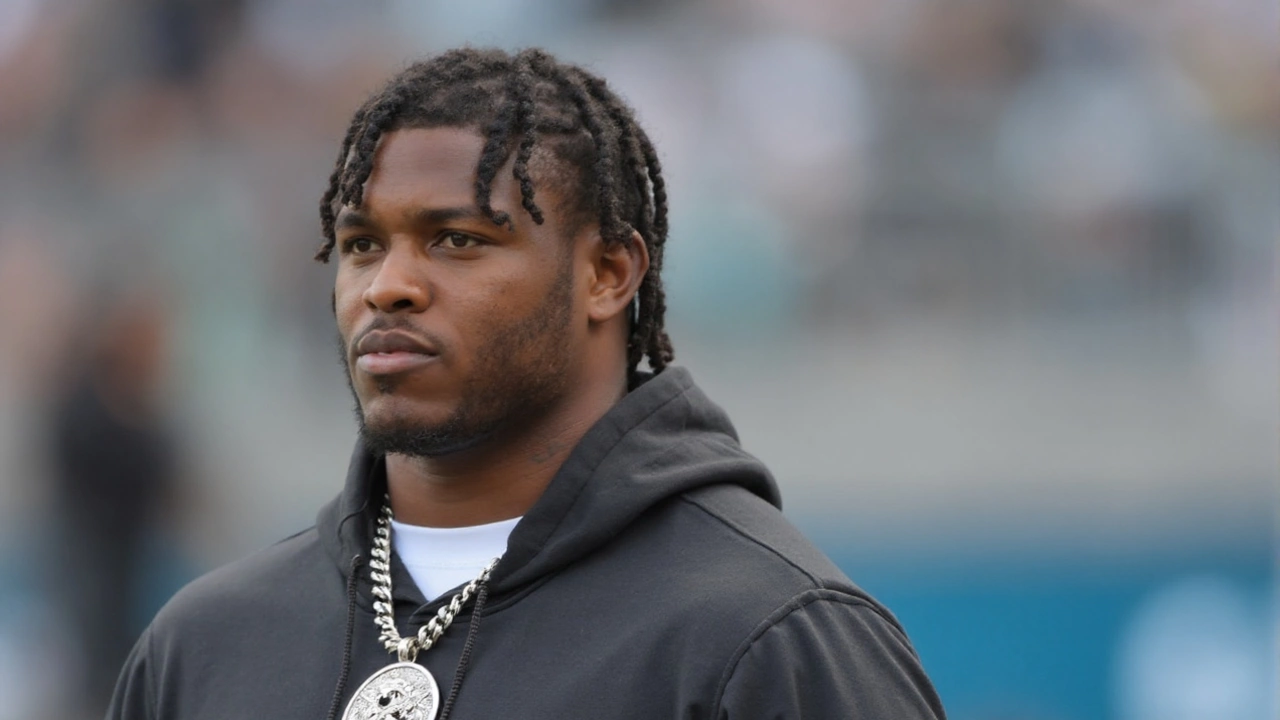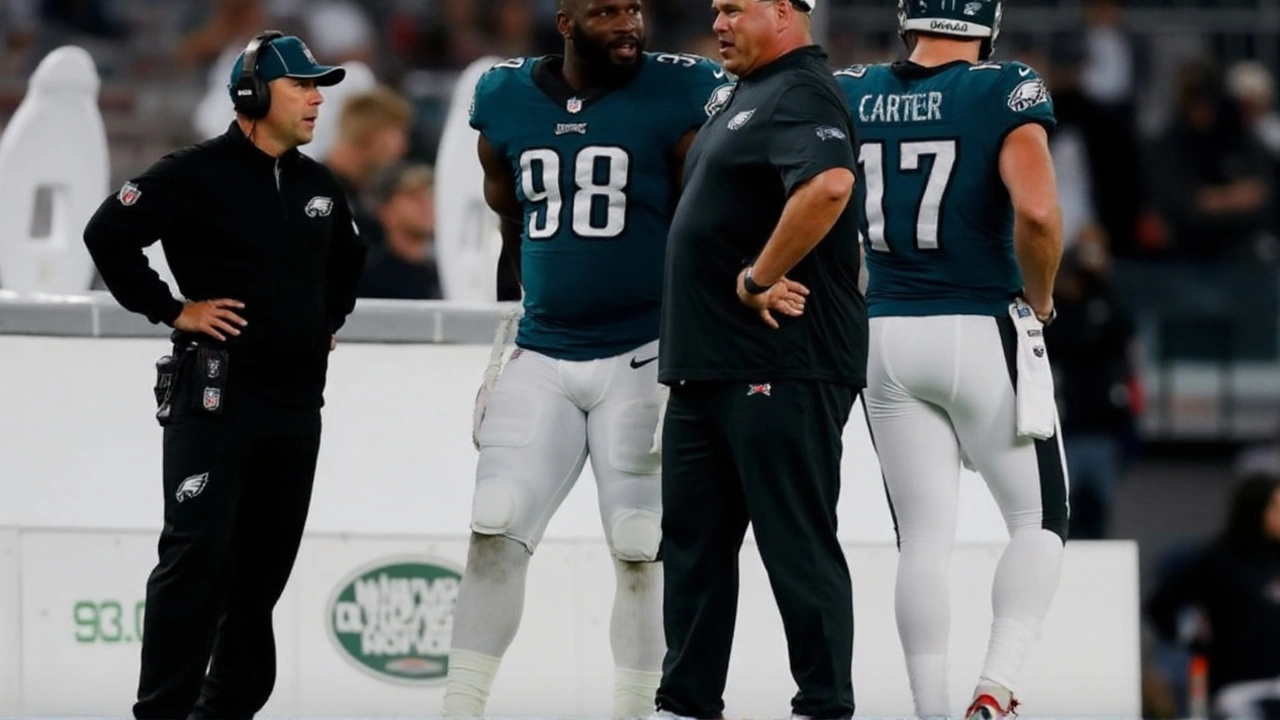Six seconds, one spit, and a stunning ejection on the NFL’s opening night
This was supposed to be a party in South Philly. Championship banner. Fireworks. A national audience. Instead, the first headline of the 2025 NFL season was an ejection before a single snap. Jalen Carter, the Philadelphia Eagles’ Pro Bowl defensive tackle, was tossed just six seconds into Thursday’s season opener against the Dallas Cowboys after spitting on quarterback Dak Prescott at midfield.
The scene unraveled fast at Lincoln Financial Field on September 4. After an injury pause on the opening kickoff, both offenses and defenses took the field. Carter and Prescott met near the logo. They exchanged words. TV cameras caught Carter spitting toward Prescott’s jersey, right in front of an official. The flag flew immediately for unsportsmanlike conduct, and the referee signaled ejection before the first play from scrimmage.
On the NBC broadcast, producers later noted that Prescott had spit toward the ground moments earlier. What sparked the back-and-forth is still unclear. What’s not up for debate: NFL rules treat spitting at an opponent as a disqualifying act. Under Rule 12 (Unsportsmanlike Conduct), spitting is explicitly prohibited and can lead to immediate removal, regardless of whether the ball has been snapped.
As Carter walked off, boos rolled through the stadium that had been primed to celebrate last season’s title. The Eagles lost their interior anchor, and Dallas pounced. Prescott marched the Cowboys 53 yards in six plays, capped by a 1-yard run from Javonte Williams, for the game’s opening touchdown. For a defense built to win up front, losing its most disruptive tackle on the first series was a gut punch.
- Time of incident: six seconds into the game, before the first snap.
- Penalty: unsportsmanlike conduct for spitting; immediate ejection.
- Broadcast note: Prescott had spit toward the ground prior to the exchange.
- Immediate impact: Dallas opened with a six-play, 53-yard touchdown drive.
Carter, 24, apologized after the game. He called it a mistake and said he felt he let down his teammates and fans, promising it wouldn’t happen again. Prescott downplayed the moment, saying he’d been trying to mess with one of his linemen and felt the need to spit, which he suggested may have triggered Carter’s reaction. Neither player shed much light on the words exchanged.
The rarity of the ejection fueled the shock. Ejections aren’t new in the NFL, but getting tossed before the first play is vanishingly rare. It also cut to the heart of how the league wants Week 1 to look. “Respect for the opponent” has been a point of emphasis in recent seasons in talks among league officials, clubs, and players. That theme is likely to shape whatever comes next.
The football fallout was immediate. The Eagles’ defensive plan leans on interior pressure to collapse pockets and force quarterbacks into bad throws. Carter isn’t just a pass rusher; he draws double teams, muddies run lanes, and changes protections. Without him, Philadelphia had to reshuffle its fronts and lean on rotation linemen. Against a quarterback who thrives in rhythm, that’s not how you start a night meant to be scripted for the home team.
Last season, Carter made his first Pro Bowl with 4.5 sacks and 42 total tackles. Those are nice numbers, but they undersell his effect on a down-to-down basis. The ball comes out faster when he’s on the field. Guards and centers slide his way. Edge rushers feast when the middle caves. Eagles GM Howie Roseman spent the summer pointing to that gravity, saying Carter’s presence creates chances for everyone around him. On Thursday night, that presence lasted all of six seconds.
The league office is reviewing the play for further discipline. According to Pro Football Talk, the NFL will weigh Carter’s remorse as part of the process. That tracks with how the league has handled visible acts of disrespect, especially on high-profile stages: fines are common, and suspensions are on the table if the act is deemed egregious. There’s no official timetable, but these reviews usually move quickly in the opening weeks, often landing by midweek so clubs can plan.
For the Eagles, the timing is lousy. The opener sets tone, and this one flipped from celebration to damage control in a blink. If a suspension comes, it forces an early test of depth inside. Coaches can dial up pressure with blitzes and simulated pressures, but that’s not the same as winning with four and trusting the back end. You also don’t replace the way Carter resets the line of scrimmage. You patch around it and hope the offense buys time.
For Dallas, the message from Prescott was simple: move on. That’s the most pragmatic way to handle a rivalry flashpoint. The Cowboys got a short field, an early lead, and a cleaner script for their first series. In games like this, early possessions tend to define how aggressive coordinators can be the rest of the way.
Context matters with Carter. He entered the league as the No. 9 pick in 2023, arguably the most talented defensive lineman in his class. He also arrived with baggage. He pleaded no contest that year to reckless driving and street racing stemming from a January 2023 car crash that killed a former Georgia teammate and staff member. Since landing in Philadelphia, the team has worked to keep the focus on growth and production. By most measures last season, it worked. Thursday’s misstep drags those questions back into the spotlight.
This is also about optics. It’s the first game of the season, national TV, and the defending champions are raising a banner. You don’t want the story to be a rules lecture in Week 1. Yet here we are, parsing the fine print of Rule 12 and replay angles of spit droplets. The NFL has been pushing sportsmanship as part of its brand message. When an official sees spitting, the book leaves little wiggle room.
What happens next follows a familiar arc. The officiating crew files a game report. The league collects broadcast footage and audio and confers with football operations. The NFLPA keeps an eye on any potential fines or suspensions in case there’s an appeal. If there’s supplemental discipline, it becomes public, and the Eagles adjust the game plan. The cycle is routine; the circumstance is not.
Inside the building, coaches and leaders will be focused on two tracks: accountability and readiness. Accountability means Carter owning it—he started that process with a public apology—and the team closing ranks without excusing the behavior. Readiness means the defensive staff scripting fronts and pressures that can survive without their top disruptor if he’s sidelined. You don’t want to live by blitzing, but you may have to flirt with it if the four-man rush stalls.
Publicly, expect the Eagles to keep language tight. Roseman has praised Carter’s growth and dominance since camp. That gives the front office a base message to return to: player development isn’t linear, but standards are firm. Privately, the staff knows this isn’t about speeches. It’s about the next snap and how to get off the field on third-and-6.
Rivalry games can run hot. Eagles–Cowboys always does. The difference between edge and over-the-edge is a thin line, and it looked even thinner in slow motion. The NFL’s stance here is simple: spitting crosses that line, full stop. Whether there’s a fine, a suspension, or both, the tape is the tape, and the season marches on.
For Carter, the path forward is equally simple and hard. Apologize, absorb the consequences, and get back to playing the kind of disruptive football that made him a centerpiece of a championship roster. For the Eagles, the immediate concern is on-field: how quickly can the defense recalibrate if he’s unavailable? For Dallas, it’s the opposite: bank the fast start, bottle it, and try to carry it into the next series, the next quarter, the next week.
It will go down as one of the strangest opening sequences you’ll ever see in the NFL—a six-second detour from banner night to disciplinary review. What should have been a coronation became a reminder: the margin for error, in this league and in this rivalry, is razor thin.

What comes next: review, discipline, and on-field adjustments
The NFL’s review will look at three things: intent, remorse, and precedent. Intent is what the tape and officiating report can show. Remorse is what the player says and how he follows through. Precedent is where the league has leeway. Spitting is clearly banned; supplemental discipline is common when the act is clear on camera. Given the prime-time stage and the league’s emphasis on respect, a fine feels likely; a suspension is possible.
If a suspension drops, Philadelphia turns to rotation depth and scheme. That means more snaps for interior linemen behind Carter and tweaks to the rush plan—stunts, games, and pressure looks designed to muddy reads without selling out. It’s not about reinventing the wheel. It’s about stealing a few third downs until the front settles in. If there’s no suspension, the work shifts to trust: in the locker room, on the sideline, and in the film room.
From a rivalry standpoint, both teams will try to de-escalate. The Cowboys don’t need a public feud after taking the early edge. The Eagles don’t want distractions as they defend a title. The easiest path is the most boring one: accept the penalties, learn the lesson, and focus on the next 60 minutes of football.
The season is long, and opening nights are unforgiving. One moment can flip the script. On Thursday, it did—before the script even started.

